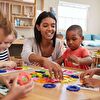Quality early learning experiences for all children are a key driver of school readiness, vital to improving high school graduation rates and critical to an individual’s economic success and ability to contribute to their community. A child’s early years, from birth until school age, are a unique period of growth and development. In fact, 85 percent of the brain’s development happens before kindergarten. Learning to walk and talk, beginning to think independently, understanding how to communicate, and learning to control impulses and emotions – are all critical early learning skills that build the necessary foundation for successful future learning.
Decades of research show that high quality early childhood experiences, inside and outside the home, can make a significant difference for children, creating a vital pathway for success in school and life. Children’s brains are being hard-wired in the first five years for future learning: communications, social/emotional skills and critical early learning skills are formed in these early years.
- Research in neuroscience shows the critical impact that relationships between children and caregivers have on the developing brain during the first months and years of life.
- Brain development research also demonstrates that social, emotional and intellectual learning are inextricably linked. Supportive relationships and healthy interactions actually shape brain circuits and lay a foundation for academic and developmental successes. Developing positive behaviors during the early years is critical, as brain circuits are actively developing during that time.
- Positive early learning experiences, at home and in other settings, can make a significant difference for children from the moment they’re born.
Just as a solid foundation can support a house, the fundamental support of early learning makes a tremendous difference in the long run. It impacts not just how well children perform and socially interact in kindergarten, but whether they’ll be reading well by third grade, succeeding in eighth grade or graduating high school. The skills we look for in workers – critical thinking, problem solving, and working on teams – are all built on the foundation of those early years. On the other hand, lack of access to quality early learning experiences and other resources to support positive child development contribute to the readiness gaps evident on the first day of kindergarten. In addition, chronic stressors in the early years – like persistent poverty, poor health and nutrition, family instability,, and homelessness – can dramatically weaken that foundation.
Parents are a child’s first teacher, but many families don’t have the time or access to encourage early learning, or feel they don’t have time to do what it takes to prepare their child for school.
Born Learning is designed to support those families.





